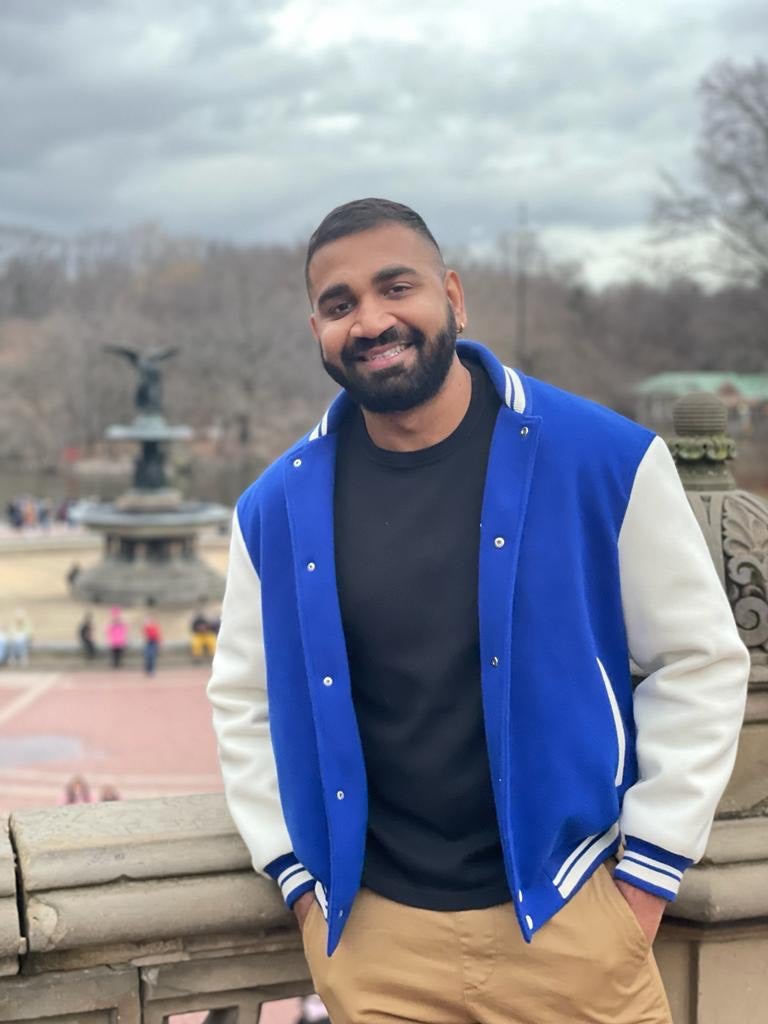Roch DeSilva
Posted in ISM Stories

Roch DeSilva is a 6th-year graduate student hoping to complete his PhD this year in Professor Steven Metallo’s lab. He enjoys playing tennis and cooking (and jokes that if science doesn’t work out for him, he would open a restaurant). At Georgetown, Roch’s research centers on intrinsically disordered proteins (IDPs) and looks for small molecules that bind to them. IDPs lack defined conformations unlike structured proteins, but can still be biologically active in organisms and cellular processes. Their dysregulation can result in different diseases, including cancer and neurodegenerative diseases like Alzheimer’s. IDPs are complicated because they defy traditional drug-binding mechanisms since they fluctuate so much, which makes finding alternate ways to bind to them a vital and exciting scope of research. Specifically, Roch is looking for sequence specificity and whether it helps small molecules bind to IDPs.
Originally from Sri Lanka, Roch came to the U.S. for college and completed his undergraduate degree in Chemistry and French at Bates College in Maine. After graduation, he spent some time getting a feel for research while working as a research assistant in a lab with Harvard Medical School at Boston Children’s Hospital. There, he studied how certain depressive states affect neurochemistry. After, he returned to Sri Lanka, where he again worked at a hospital in Colombo. This time, his clinical research focused on studying the efficacy of a vaccine against dengue, a mosquito-borne virus that kills 40,000 people per year. Roch returned to the U.S. when he decided to pursue a PhD.
Roch enjoys research because even though it can be very demanding and come with many highs and lows, he can push through by telling himself that he is discovering something new. He feels that research requires a lot of mental effort and focus, but it is made easier because it is accomplishing something important. Although looking at the work directly can seem very specific or remote, when in the big picture his work might help find a pathway to curing diseases, it is rewarding and motivating. Additionally, Roch feels that his identity as a scientist helps him think critically about other aspects of his life, as he can apply a scientific method and frame of mind to ordinary scenarios and problems.
Roch is particularly proud of his current research on IDPs, looking at if small molecules can bind to IDPs and if one can find a way to target IDPs. Since IDPs affect so many diseases but have continually posed a problem because nobody has found a way to deal with them, Roch’s work furthering knowledge on IDPs and finding new ways to think about them is definitely something to appreciate and admire.
A big factor in Roch’s decision to come to Georgetown was its location. Growing up in Colombo, the biggest city in Sri Lanka, he felt that his experience in his undergraduate years was spent at a smaller school and wanted something that could help him feel more in touch with his home. D.C. became an ideal place because it was a way to meet new people and have more opportunities for a broader range of experiences. Additionally, Georgetown’s structure of different schools and status as a prestigious institution in multiple professional programs meant he could meet people across many different fields of academics. For his work specifically, Roch appreciates the tight-knit sense of Professor Metallo’s lab, where he has adequate support to reflect on problems and more freedom to do science at his own pace than he might have at other institutions.
Although Roch’s background was in a different type of research, he was drawn to Professor Metallo’s lab because IDPs are new and exciting. His connection to soft matter comes from his involvement with Professor Metallo, and his work characterizing proteins and small molecules. ISM equipment, such as the dynamic light scattering (DLS) instrument, enables him to further his research.
When asked whether he would stick with laboratory research or return to a clinical setting, Roch explains that his potential future plans involve scientific consulting. He wants to stay in science because his foundations are in scientific research but feels that working at the combination of business and science can be a perfect midpoint between his experience and his next goals. He wants to focus on smaller projects instead of one large project, and scientific consulting will allow him to broaden and diversify his projects, letting him still talk about science, but apply it to other areas, such as how to deliver a drug or vaccine into the market or talk to people about side-effect profiles.
